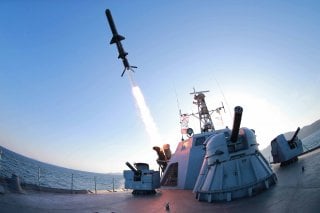Can the U.S. Navy Alone Destroy North Korea's Military?
It would likely not act alone during a war with North Korea.
And lastly, to swerve back to purely saltwater campaigns, there’s the least violent option: a full-bore naval blockade of the peninsula. Enforced with vigor and sufficient assets, a blockade would deprive North Korea of imported fuel, foodstuffs, and other commodities the beleaguered country must have to survive and fight. It would also balk Pyongyang’s efforts to export weapons, the makings of weapons, and bomb-making expertise to earn hard currency.
Corbett observes that a navy can apply pressure on a foe’s “national life” from day one of a conflict. Over time, he writes, it could exhaust that foe gradually—laying him low. But again, naval forces can only perform their blocking function at sea. They have little way to obstruct overland transit across North Korea’s northern border unless Washington wants to risk tangling with Chinese or Russian forces, and escalating a local conflagration to great-power war. Few relish that prospect. It’s a safe bet, then, that any blockade would leak to one degree or another.
For such reasons Corbett and Wylie caution that purely naval action seldom wins wars; Wylie verges on saying they never win wars. Only groundpounders can. To quote T. R. Fehrenbach’s classic history of the Korean War:
You may fly over a nation forever, you may bomb it, atomize it, pulverize it and wipe it clean of life. But if you desire to defend it, if you desire to protect it, if you desire to keep it for civilization, you must do this on the ground the way the Roman legions did: by putting your young men in the mud.
As it was in the 1950s, so it is now. Sea power furnished the Trump administration military options in its confrontation with North Korea, but none of them promises easy, quick, or painless results. Thankfully, this is not lost on high-ranking defense officials. Former Secretary of Defense Jim Mattis, to name one, is reportedly a fan of Fehrenbach’s treatise. Indeed, Secretary Mattis quoted him while holding forth on how a second Korean War would unfold. That’s good. It betokens strategic sobriety and humility—virtues any commander should cultivate.
The greats of strategy are smiling.
James Holmes is J. C. Wylie Chair of Maritime Strategy at the Naval War College and author of “Visualize Chinese Sea Power,” in the current issue of the Naval Institute Proceedings. The views voiced here are his alone.
This piece first appeared earlier and is being reprinted due to reader interest.
Image: Reuters.

